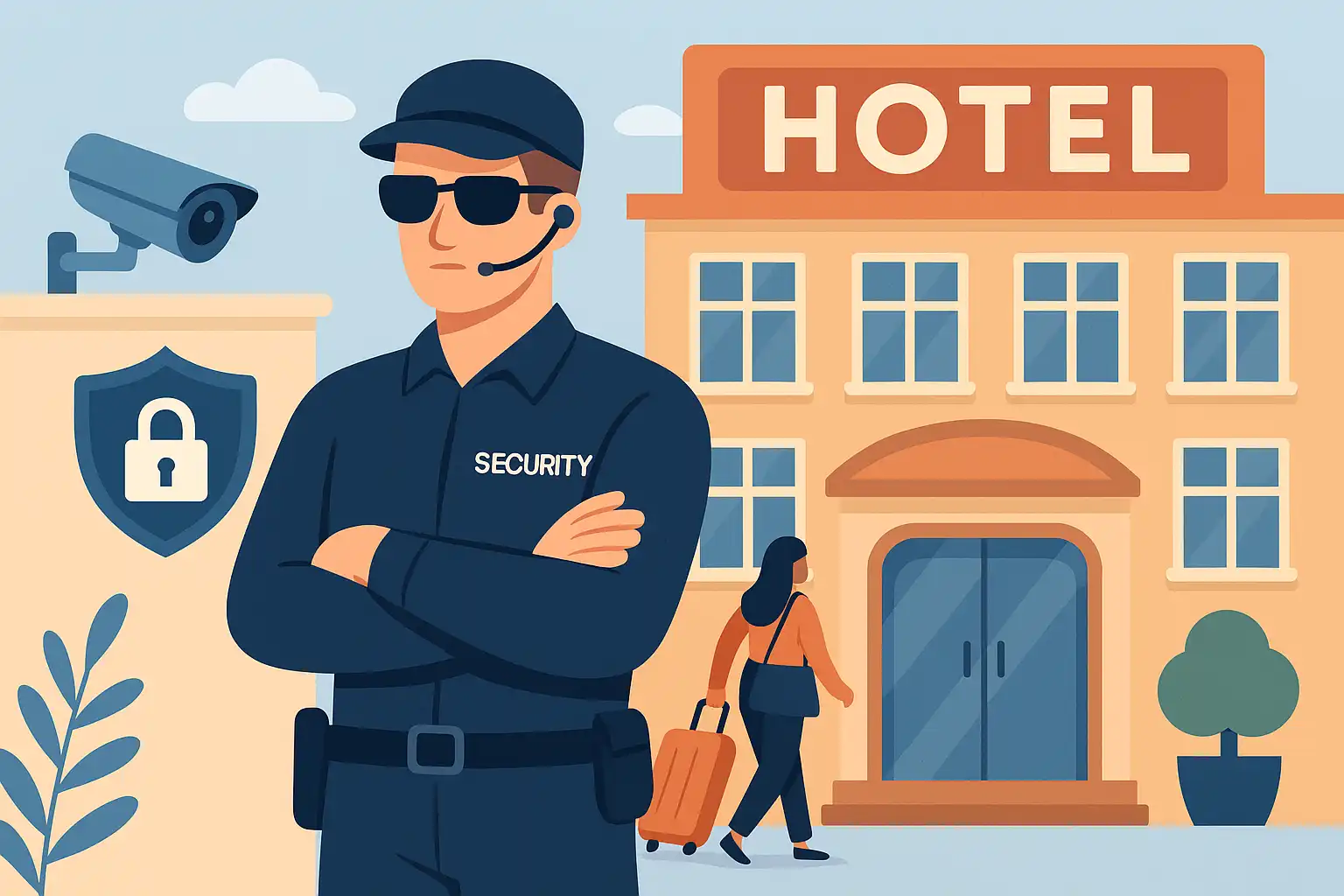Hotel Security: Protect Guests and Property
 Mika Takahashi
Mika Takahashi Mika Takahashi
Mika TakahashiIn today’s hospitality world, hotel security is about so much more than just locking doors and having guards on site. With 68% of travelers saying safety is their top priority when booking, having strong hotel security isn’t just a nice-to-have — it’s essential for keeping guests happy, running operations smoothly, and protecting your bottom line.
Modern hotel security is a smart blend of sturdy physical setups, cutting-edge hotel security systems, well-trained security personnel, and carefully designed hotel security procedures. Together, these elements work to keep hotel guests, staff, and property safe from a wide range of risks. From the classic issues like theft and vandalism to newer threats such as cybercrime, terrorism, and fraud, hotel security systems today need to cover all bases.
The hotel industry faces unique challenges that set it apart from other businesses. Hotels have to strike a delicate balance: creating a welcoming atmosphere while putting in place strong hotel security measures, respecting guest privacy while keeping a watchful eye through surveillance, and ensuring round-the-clock protection across guest rooms, public spaces, parking lots, and behind-the-scenes areas.
This detailed guide dives into every corner of modern hotel security — from the basics to the latest innovations shaping hospitality safety. Whether you’re a hotel manager looking to boost your current hotel security or a professional planning new hotel security procedures, you’ll find valuable insights here to help create a secure environment that protects guests without compromising the warm, welcoming vibe that makes hotels feel like a home away from home.

Hotel security is all about taking a comprehensive approach to protect guests, staff, property, and sensitive data. It involves a mix of hotel security systems and procedures aimed at preventing, detecting, and responding to a variety of threats. This means physical hotel security like access control, surveillance cameras, alarm systems, and smart lighting; personnel security including background checks and ongoing training; guest protection through room safety and secure storage; and cybersecurity to guard personal data and payment systems.
Hotels today face a broad spectrum of hotel security challenges. While theft, assault, and vandalism remain concerns, new risks like terrorism, organized crime, cyber attacks, and fraud require constant vigilance and adaptability. Operating globally adds another layer of complexity, as hotels must navigate local crime trends, cultural differences, and varying regulations.
Recent research shows that guest expectations around hotel safety have grown sharply. Beyond the 68% who prioritize safety when booking, 84% expect to see visible hotel security measures during their stay. Guests care about both physical safety and data protection, with growing worries about identity theft, payment fraud, and privacy breaches.
Hotel security incidents don’t just cause immediate headaches—they can have long-lasting business impacts. A single major breach can cost a hotel $2.3 million in reputation damage alone, with occupancy rates dropping for months or even years afterward. Insurance premiums often jump 25-40% after incidents, and legal liabilities can be hefty if hotel security measures fall short and guests or staff get hurt.
Thanks to advances in hotel security technology, protection has reached new heights. AI-powered surveillance can spot suspicious behavior in real time, and integrated hotel security systems offer precise permission management and detailed audit trails. But these sophisticated systems require investment, upkeep, and trained staff to get the most out of them.
The financial stakes of hotel security go well beyond the obvious costs of theft or property damage. Hotel security incidents ripple through operations, affecting everything from day-to-day expenses to long-term brand positioning and competitive edge.
Studies show that a single hotel security incident can cause around $2.3 million in reputation damage alone. This includes lost bookings, reduced room rates, increased marketing spend to rebuild trust, and a hit to customer lifetime value. Hotels that suffer high-profile breaches often see occupancy drop 15-25% right after, with recovery taking a year or more despite best efforts.
Legal risks add another layer of concern. Hotels face lawsuits averaging $1.8 million for cases where poor hotel security led to guest injuries. Compliance requirements keep growing too, covering everything from ADA safety standards to state-specific mandates and international rules for global travelers.
Guest expectations vary: business travelers focus on cybersecurity and data protection, while leisure guests care more about physical safety and theft prevention. Luxury hotel guests want discreet but thorough protection, while budget travelers look for clear hotel security presence as reassurance.
Staff safety is also a key reason to invest in hotel security. Hotels with strong hotel security protocols see 40% lower staff turnover, thanks to better confidence, less workplace stress, and fewer incidents of violence or harassment. These savings on recruitment and training often justify hotel security spending on their own.
The true cost of hotel security breaches covers many areas beyond the obvious. Theft incidents typically cost hotels around $15,000 when factoring in stolen goods, investigations, insurance deductibles, and disruptions. But that’s just the start.
Data breaches are far more expensive, averaging $4.24 million per event. Costs include forensic investigations, legal fees, fines, credit monitoring for guests, and rebuilding secure systems. Hotels handling international guest data face extra risks under GDPR and similar laws, with fines up to 4% of annual revenue.
Physical assault lawsuits tied to poor hotel security average $1.8 million in settlements, plus hundreds of thousands in defense costs. These figures don’t include the indirect fallout like bad publicity and regulatory scrutiny that can hurt property values and franchise relations.
Insurance premiums often rise 25-40% after incidents, but that’s just the baseline. Properties with poor hotel security might face limited coverage, higher deductibles, or trouble getting full insurance. Some insurers now require specific hotel security measures as a condition of coverage, making investments mandatory.
ROI studies show hotel security investments often pay for themselves within 18 months. Savings come from fewer theft losses, lower insurance costs, and reduced legal exposure. Plus, better guest satisfaction leads to more repeat business and higher room rates, while staff turnover drops cut recruitment expenses.
Hotels that act proactively spend 60-70% less on hotel security upgrades than those scrambling after breaches. Reactive fixes are usually pricier and harder to integrate, making early investment the smart move.
Strong hotel security starts with solid physical infrastructure that layers protection while keeping the hotel property inviting. Modern designs combine architecture, technology, and procedures to guard the perimeter, building envelope, and interior spaces.
Perimeter security is the first line of defense, using smart design to control access without looking like a fortress. Decorative fencing and landscaping serve as barriers and beautification, while automated vehicle gates verify authorized cars without slowing traffic.
Landscaping plays a big role by removing hiding spots and guiding foot traffic toward monitored entrances. Thorny bushes and low plants deter intruders while trees provide shade without blocking hotel security cameras or offering climbing spots.
Building envelope protection secures all possible entry points. Impact-resistant windows let in light while preventing forced entry. Reinforced doors use commercial-grade locks integrated with electronic access control. Loading docks get special attention with physical barriers and full monitoring.
Inside, hotels create zones to limit access based on function and risk. Guest areas, staff zones, and restricted spaces each have tailored hotel security measures. Secure storage protects valuable inventory and sensitive documents with multiple hotel security procedures.
Lighting balances hotel safety and energy efficiency. Parking lots need at least 5 foot-candles of light for surveillance, while entrances require 10 foot-candles for facial recognition. Modern LEDs deliver bright, cost-effective illumination.

The main entrance is where hotel security and hospitality meet. It needs clear sightlines, screening capabilities, and a welcoming look. Designs use natural surveillance principles so staff and hotel security cameras can watch activity without making guests feel uncomfortable.
Metal detectors at entrances have become more discreet, avoiding airport-style hassles while spotting weapons or contraband. These often tie into visitor management systems that verify IDs, screen backgrounds, and keep digital visitor logs.
Secondary exits pose challenges because they must allow emergency egress but prevent unauthorized use. Delayed egress doors meet fire codes by giving a short delay with alarms, letting emergencies out while discouraging casual breaches.
Loading docks require special care due to deliveries and service access. Scheduled deliveries, vendor verification, and CCTV monitoring keep these vulnerable spots secure.
Fire code compliance means emergency exits must allow quick evacuation without compromising hotel security. Hotel security and fire systems often work together to override restrictions during emergencies.
Hotel security technology now integrates surveillance, access control, detection, and communication into unified platforms. These hotel security systems share data, coordinate responses, and offer centralized management that boosts hotel security and efficiency.
Video surveillance is the backbone, with 4K IP cameras providing crisp images for ID and evidence. Remote access and real-time monitoring let hotel security teams keep watch from anywhere. AI analytics detect motion, faces, and unusual behavior automatically.
AI helps spot loitering, crowds, abandoned items, and suspicious movements while filtering out normal activity to reduce false alarms. Machine learning improves detection by learning each hotel’s unique patterns.
Cloud storage keeps surveillance footage for 90 days, balancing hotel security needs with costs and privacy rules. Intelligent compression saves space while maintaining quality for recent recordings.
Access control uses RFID, biometrics, and mobile credentials for flexible hotel security. Real-time monitoring tracks access attempts and flags unusual patterns. Audit trails support investigations and compliance.
Intrusion detection combines motion sensors, glass break detectors, and perimeter technologies like infrared beams and vibration sensors to catch break-in attempts.
Integration platforms connect all hotel security systems into a command center, letting hotel security staff manage everything from one place. Incidents trigger coordinated responses automatically.
IoT sensors monitor room occupancy, environmental conditions, and equipment status. They detect unusual room usage or tampering and alert hotel security personnel.
Facial recognition helps identify VIPs and banned individuals, improving hotel security and guest service. Privacy rules require careful implementation.
Mobile panic buttons give hotel security staff instant emergency alerts with GPS location for quick help.
Predictive analytics use data and patterns to forecast hotel security risks, helping hotels adjust staffing and communication proactively.
Environmental sensors track air quality, temperature, and hazards, triggering automated emergency responses.
Access control decides who can enter hotel premises, balancing hotel security with smooth operations. Modern hotel security systems go beyond keys to electronic platforms offering detailed logs and real-time control.
RFID key cards prevent duplication and keep hotel security records. Lost cards can be instantly deactivated.
Multi-factor authentication combines cards with PINs or biometrics for high-security zones.
Mobile keys let guests use smartphones to unlock hotel rooms securely, reducing physical cards and risks.
Master key systems manage staff access with time and zone restrictions, plus emergency overrides.
Key management includes daily audits, replacement schedules, and secure storage.
Administrative controls limit hotel security system changes to authorized personnel with role-based permissions.
Guest room doors use commercial-grade locks meeting high hotel security standards. Electronic locks have backup mechanical keys and battery monitoring.
Privacy locks let guests secure hotel rooms from inside without overriding hotel security access in emergencies.
Window locks prevent unauthorized entry while allowing emergency escape.
In-room safes provide secure storage with digital locks and audit trails.
Emergency communication systems connect guests directly to hotel security or emergency services.
Peepholes offer wide-angle views for guest safety, sometimes with electronic recording.
Hotel security cameras cover all public areas with overlapping views to avoid blind spots. Different camera types handle facial recognition, license plates, and general monitoring.
Lobbies, elevators, corridors, stairwells, parking, and exterior spaces all receive high-quality hotel security coverage.
Hotel security officers trained in surveillance and incident response monitor feeds 24/7, with clear protocols for emergencies.
Video analytics spot suspicious behaviors and alert operators, reducing missed threats.
Surveillance footage is managed carefully for legal use, with chain of custody and encryption.
Communication between surveillance and hotel security teams ensures timely incident response.
Balancing hotel security with guest privacy is essential. Cameras avoid private areas like hotel rooms and restrooms while covering public spaces.
Regulations vary by location and require disclosures and limits on monitoring.
Data retention policies manage how long surveillance footage is stored, with automated deletion of old files.
Access to footage is restricted to authorized hotel security staff with audit trails to prevent misuse.
International laws like GDPR and CCPA affect hotel security surveillance practices, requiring careful compliance.
Training is the foundation of hotel security. All employees learn to recognize hotel security threats, respond properly, and know when to alert hotel security or emergency services.
Training covers identifying suspicious behavior, emergency evacuations, communication protocols, and basic first aid.
Guest interaction training helps hotel staff balance hotel security with hospitality, providing discreet monitoring and positive guest experiences.
Ongoing education keeps hotel staff updated on new hotel security threats and technologies.
Specialized training addresses front desk fraud detection and housekeeping vigilance.
Clear leadership roles and communication chains ensure coordinated action during hotel security emergencies.
Backup leaders cover absences to maintain command.
Communication tools and reporting formats keep everyone informed.
Evacuation plans detail routes, assembly points, and guest assistance, including for those with disabilities.
Medical response protocols include AED placement and first aid.
Coordination with local law enforcement ensures fast, effective help.
Crisis communication manages media, guest notifications, and privacy.

Preventing theft requires layered approaches against external criminals and internal employee theft.
Guest screening at check-in uses ID verification and payment authentication to stop fraud.
Advanced ID checks scan documents and cross-reference databases, including law enforcement lists.
Secure payment systems detect suspicious transactions in real time.
Inventory tracking monitors hotel assets with RFID, barcodes, and audits.
Hotel staff training teaches theft recognition and proper reporting.
Financial security includes PCI DSS compliance and encrypted payment processing.
Employee background checks and ongoing monitoring reduce insider risks.
Guest data is safeguarded with strong encryption standards protecting data at rest and in transit.
Network security uses firewalls, intrusion prevention, and regular testing.
Hotel staff training on phishing and password management reduces human error.
Incident response plans outline breach notifications and recovery steps.
Hotels aim to protect guests invisibly, blending hotel security into the experience without making guests feel like they’re in a fortress.
Design integrates hotel security devices aesthetically and places technology discreetly.
Hotel staff training emphasizes hospitality-focused hotel security with positive guest interactions.
Mobile apps and user-friendly access controls enhance convenience alongside hotel safety.
Messaging highlights hotel safety and comfort, avoiding alarmist language.
Hotel security features are presented as guest amenities that add value.
Hotel security personnel maintain professional, approachable appearances.
Guests receive clear information about hotel security resources without worry.
Feedback systems let guests report concerns discreetly.
AI is transforming hotel security with predictive threat detection and automated responses.
Contactless technologies reduce touchpoints, improving safety and hygiene.
Integration with smart city systems enhances emergency coordination.
Sustainability is growing in importance, with energy-efficient systems and eco-friendly materials.
Biometric authentication expands beyond fingerprints to facial and iris recognition.
Blockchain shows promise for secure identity and audit trails.
The hotel industry continues innovating while keeping guest comfort at the heart of hotel security. Properties that balance technology with hospitality will stand out as trusted, safe havens for travelers worldwide. This ongoing commitment to hotel security excellence is key to protecting guests and staying competitive in a complex global market.